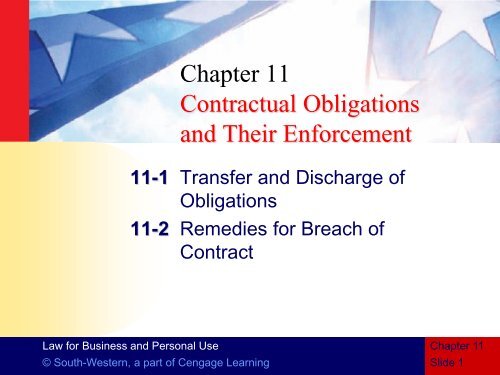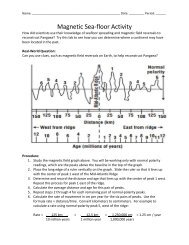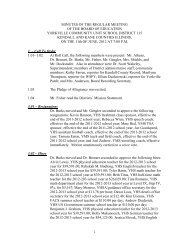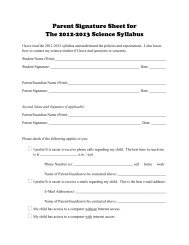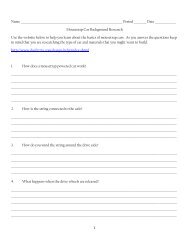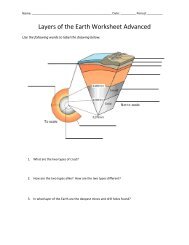CHAPTER 11 Contractual Obligations and their Enforcement
CHAPTER 11 Contractual Obligations and their Enforcement
CHAPTER 11 Contractual Obligations and their Enforcement
You also want an ePaper? Increase the reach of your titles
YUMPU automatically turns print PDFs into web optimized ePapers that Google loves.
Chapter <strong>11</strong><br />
<strong>Contractual</strong> <strong>Obligations</strong><br />
<strong>and</strong> Their <strong>Enforcement</strong><br />
<strong>11</strong>-1 Transfer <strong>and</strong> Discharge of<br />
<strong>Obligations</strong><br />
<strong>11</strong>-2 Remedies for Breach of<br />
Contract<br />
Law for Business <strong>and</strong> Personal Use<br />
Chapter <strong>11</strong><br />
© South-Western, a part of Cengage Learning Slide 1
<strong>11</strong>-1 Transfer <strong>and</strong><br />
GOALS<br />
Discharge of <strong>Obligations</strong><br />
• Identify what rights can be assigned <strong>and</strong><br />
what duties delegated<br />
• Describe the various ways in which<br />
contractual obligations may be discharged<br />
Law for Business <strong>and</strong> Personal Use<br />
Chapter <strong>11</strong><br />
© South-Western, a part of Cengage Learning Slide 2
THE TRANSFER OF CONTRACT<br />
RIGHTS AND DUTIES<br />
• Assignment<br />
• Transfer of contractual right to another party<br />
• Assignor<br />
• Party who transfers the contractual right<br />
• Assignee<br />
• Party who receives the contractual right<br />
• Obligor<br />
• The one who owes a duty under contract<br />
Law for Business <strong>and</strong> Personal Use<br />
© South-Western, a part of Cengage Learning<br />
Chapter <strong>11</strong><br />
Slide 3
What’s Your Verdict Page 191<br />
• Whipple bought a highpowered<br />
sports coupe from<br />
Boss Motors for $32,000.<br />
After a down payment of<br />
$2,000, the balance, plus<br />
interest, was to be paid by<br />
mail in installments over 48<br />
months. Boss Motors<br />
needed cash to purchase<br />
new cars. It immediately<br />
sold Whipple’s contract to a<br />
finance company, Palmout<br />
Inc. It told Whipple to mail<br />
all payments to Palmout.<br />
• Is such a transfer of<br />
contract rights legal<br />
• Yes<br />
• What term describes<br />
this transfer<br />
• Assignment<br />
• Who is the assignor<br />
• Boss Motors<br />
• Who is the assignee<br />
• Palmout Inc.<br />
• Who is the obligor<br />
• Whipple<br />
Law for Business <strong>and</strong> Personal Use<br />
© South-Western, a part of Cengage Learning<br />
Chapter <strong>11</strong><br />
Slide 4
THE TRANSFER OF CONTRACT<br />
RIGHTS AND DUTIES<br />
• Assignable rights<br />
• May assign contractual rights as long as<br />
performance will not be changed materially<br />
• Non-assignable rights<br />
• You cannot assign contractual rights if<br />
performance requirements are materially<br />
changed<br />
Law for Business <strong>and</strong> Personal Use<br />
Chapter <strong>11</strong><br />
© South-Western, a part of Cengage Learning Slide 5
THE TRANSFER OF CONTRACT<br />
RIGHTS AND DUTIES<br />
• Form of assignments<br />
• Usually voluntarily by the assignor<br />
• Can be oral or written (some require written)<br />
• Notice of assignments<br />
• Until notification, obligor continues to pay assignor<br />
• After notification, obligor is liable to the assignee<br />
• Delegation of contractual duties<br />
• Can delegate duties (routine tasks), but person<br />
remains legally responsible for proper performance<br />
Law for Business <strong>and</strong> Personal Use<br />
© South-Western, a part of Cengage Learning<br />
Chapter <strong>11</strong><br />
Slide 6
DISCHARGE OF CONTRACTUAL<br />
OBLIGATIONS<br />
• By performance<br />
• Terms to Know (page 193)<br />
• Discharge<br />
• Breach of Contract<br />
• Substantial Performance<br />
• Defaults<br />
• Anticipatory Breach<br />
Continued on the next slide<br />
Law for Business <strong>and</strong> Personal Use<br />
Chapter <strong>11</strong><br />
© South-Western, a part of Cengage Learning Slide 7
DISCHARGE OF CONTRACTUAL<br />
OBLIGATIONS<br />
• Timing of performance<br />
• If timing not stated, then duty must be performed with a<br />
reasonable time<br />
• Example: shipping tomatoes vs. shipping furniture<br />
• If contract identifies performance date,<br />
• If performance occurs shortly after the date, this will normally<br />
be considered a minor breach<br />
• If contract states that „time is of the essence”, failure to<br />
perform by that date could be considered a major breach<br />
• Note: Courts look at the subject matter <strong>and</strong> specific<br />
circumstances to determine if “time is of the essence”, not<br />
just the words in the conract.<br />
Law for Business <strong>and</strong> Personal Use<br />
© South-Western, a part of Cengage Learning<br />
Chapter <strong>11</strong><br />
Slide 8
DISCHARGE OF CONTRACTUAL<br />
OBLIGATIONS<br />
• By the initial terms<br />
• Parties may agree in <strong>their</strong> contract when it will<br />
terminate<br />
• By subsequent agreement<br />
• Rescission (both parties agree to undo <strong>their</strong> contract)<br />
• Substitution (both parties agree to replace it with a new contract)<br />
• Accord <strong>and</strong> satisfaction (agreement to substitute a new<br />
contractual obligation for an existing one <strong>and</strong> the actual performance)<br />
• Novation (a third party is added to contract as substitute for one of the<br />
parties – all 3 parties have to agree)<br />
Law for Business <strong>and</strong> Personal Use<br />
© South-Western, a part of Cengage Learning<br />
Chapter <strong>11</strong><br />
Slide 9
What’s Your Verdict Page 192<br />
• Jen borrowed $2,000 from<br />
Effriham to buy a new<br />
keyboard for his b<strong>and</strong>. Jen<br />
agreed to pay the money<br />
back plus interest on Dec<br />
1 st . When Jen did not pay,<br />
Effriham, who needed<br />
money to pay bills,<br />
suggested that if Jen would<br />
pay $1,500 by Jan 15 th , he<br />
would call the loan paid in<br />
full. Jen agreed.<br />
• This is considered Accord<br />
• Even though Jen agreed,<br />
she failed to make the<br />
$1,500 payment. Effriham<br />
then brought a lawsuit<br />
against Jen for payment of<br />
the debt.<br />
• Was there Satisfaction<br />
• Will the court order Jen to<br />
pay the original amount<br />
of $2,000 or the amount<br />
under the accord of<br />
$1,500<br />
Law for Business <strong>and</strong> Personal Use<br />
© South-Western, a part of Cengage Learning<br />
Chapter <strong>11</strong><br />
Slide 10
DISCHARGE OF CONTRACTUAL<br />
OBLIGATIONS<br />
• By impossibility of performance<br />
• Extreme external conditions (strike by employees,<br />
weather related events, etc.)<br />
• Destruction of unique subject matter<br />
• By operation of law<br />
• One of the parties files for Bankruptcy<br />
• Material alteration of the terms by one party<br />
without consent of the other party<br />
Law for Business <strong>and</strong> Personal Use<br />
Chapter <strong>11</strong><br />
© South-Western, a part of Cengage Learning Slide <strong>11</strong>
DISCHARGE OF CONTRACTUAL<br />
OBLIGATIONS<br />
• By tender of performance<br />
• Tender: a ready, willing <strong>and</strong> able offer to perform<br />
an obligation<br />
• If duty requires:<br />
• Doing an act: if tender is rejected, the obligation will be<br />
discharged<br />
• Payment of money: if tender is rejected, it does not<br />
discharge the debt<br />
• It does relieve the debtor of future court costs or interest<br />
charges<br />
Law for Business <strong>and</strong> Personal Use<br />
© South-Western, a part of Cengage Learning<br />
Chapter <strong>11</strong><br />
Slide 12
<strong>11</strong>-2 Remedies for Breach of<br />
GOALS<br />
Contract<br />
• Name <strong>and</strong> describe various remedies possible<br />
for minor or major breach of contract<br />
• Discuss the factors that affect the choice of<br />
remedies<br />
Law for Business <strong>and</strong> Personal Use<br />
Chapter <strong>11</strong><br />
© South-Western, a part of Cengage Learning Slide 13
REMEDIES POSSIBLE FOR<br />
BREACH<br />
• Remedy: legal means to fix breach<br />
• Remedy for a minor breach<br />
• Not significant in relation to the contract<br />
• Only remedy is money damages<br />
• Remedies for a major breach<br />
1. Rescission <strong>and</strong> restitution<br />
• Intended to place parties in the same legal position as<br />
before they entered into contract<br />
Law for Business <strong>and</strong> Personal Use<br />
Chapter <strong>11</strong><br />
© South-Western, a part of Cengage Learning Slide 14
REMEDIES POSSIBLE FOR BREACH<br />
2. Money damages<br />
• Compensatory<br />
(actual)<br />
• Consequential<br />
(actual +<br />
foreseeable injuries)<br />
• Punitive (to punish)<br />
• Liquidated (agreed<br />
to by parties in<br />
contract)<br />
• Nominal (token<br />
amount)<br />
3. Specific performance<br />
• Order requiring parties<br />
to perform exactly as<br />
per the contract<br />
• Available when subject<br />
matter is unique<br />
• Ex. Purchase of antique<br />
custom made 1932<br />
Rolls Royce<br />
Law for Business <strong>and</strong> Personal Use<br />
© South-Western, a part of Cengage Learning<br />
Chapter <strong>11</strong><br />
Slide 15
What’s Your Verdict Page 197<br />
• Liu contracted to buy 160 acres of l<strong>and</strong> from McCall.<br />
She planned to build an amusement park on the<br />
l<strong>and</strong> as it was near the junction of two interstates<br />
<strong>and</strong> had adequate utilities <strong>and</strong> population density.<br />
• When McCall learned of her plan, he refused to<br />
transfer the title.<br />
• What remedies are available to Lui<br />
• Rescission <strong>and</strong> Restitution<br />
• Money Damages<br />
• Specific Performance<br />
• What is Lui’s optimal (best) remedy<br />
• Specific Performance<br />
Law for Business <strong>and</strong> Personal Use<br />
© South-Western, a part of Cengage Learning<br />
Chapter <strong>11</strong><br />
Slide 16
What’s Your Verdict Page 199<br />
• Jim Brushback, an unknown baseball pitcher, signed<br />
a contract to play his rookie year for a major league<br />
team for $120,000. After 2 months, Brushback had<br />
won all four games he’d started with 37 strikeouts<br />
<strong>and</strong> an earned-run average (ERA) of 1.75. He then<br />
contracted with a competitive team for $4 million a<br />
year for the next five years, thereby breaching his<br />
rookie contract.<br />
• What remedies are available to the original<br />
team<br />
• Restitution or Specific Performance<br />
Law for Business <strong>and</strong> Personal Use<br />
© South-Western, a part of Cengage Learning<br />
Chapter <strong>11</strong><br />
Slide 17
FACTORS AFFECTING CHOICE OF<br />
REMEDY<br />
• Conflict of remedies<br />
• Party injured has a choice – choosing one will<br />
eliminate the other choices<br />
• Duty to mitigate<br />
• Injured parties are required to take reasonable<br />
steps to minimize the harms<br />
• Waivers<br />
• Intentionally <strong>and</strong> explicitly giving up a contract<br />
right (creditor says “I will accept your late<br />
payment without a late charge”)<br />
Law for Business <strong>and</strong> Personal Use<br />
Chapter <strong>11</strong><br />
© South-Western, a part of Cengage Learning Slide 18
FACTORS AFFECTING CHOICE OF<br />
REMEDY<br />
• Statute of limitations<br />
• Time period to bring a lawsuit (4 years for<br />
contracts <strong>and</strong> 3 years for torts)<br />
• No remedy if time period has expired<br />
• Bankruptcy<br />
• Permits the discharge (or excusing) of debts<br />
• If a party files for bankruptcy, the other party will<br />
lose any remedy (or it will be limited)<br />
Law for Business <strong>and</strong> Personal Use<br />
© South-Western, a part of Cengage Learning<br />
Chapter <strong>11</strong><br />
Slide 19
Remedies For Breach Of Contract<br />
Law for Business <strong>and</strong> Personal Use<br />
Chapter <strong>11</strong><br />
© South-Western, a part of Cengage Learning Slide 20
PREVENT LEGAL DIFFICULTIES<br />
In the execution of contracts . . .<br />
• As a prospective assignee, determine whether the<br />
assignor is subject to any defense that may affect<br />
your claim. Do this by promptly checking with the<br />
obligor (debtor). Remember that you, as the<br />
assignee, acquire only the rights as the assignor<br />
possessed.<br />
• If you are an assignee, be sure to notify the obligor<br />
(debtor) of the assignment as soon as practicable.<br />
Law for Business <strong>and</strong> Personal Use<br />
Continued on the next slide<br />
Chapter <strong>11</strong><br />
© South-Western, a part of Cengage Learning Slide 21
PREVENT LEGAL DIFFICULTIES<br />
• Be aware that “time is of the essence” in many<br />
contracts. If a contract calls for performance by a<br />
certain time, failure to perform may be a breach of<br />
contract. When appropriate, include this requirement<br />
in your contract, <strong>and</strong> clearly state that failure to<br />
perform at the time agreed upon may be treated as<br />
a breach.<br />
Continued on the next slide<br />
Law for Business <strong>and</strong> Personal Use<br />
Chapter <strong>11</strong><br />
© South-Western, a part of Cengage Learning Slide 22
PREVENT LEGAL DIFFICULTIES<br />
• Remember that hardship <strong>and</strong> higher costs do not<br />
make performance impossible. Bad weather, fires,<br />
strikes, inability to obtain materials, or similar<br />
difficulties could cause hardship. To be protected<br />
against damages for failure to fulfill a contract because<br />
of such events, include in the contract a clause to that<br />
effect.<br />
• Negotiate, <strong>and</strong> if possible, mediate or voluntarily<br />
arbitrate, before you litigate. A lawsuit should be the<br />
final resort because it is costly in time, money, <strong>and</strong><br />
goodwill.<br />
Continued on the next slide<br />
Law for Business <strong>and</strong> Personal Use<br />
Chapter <strong>11</strong><br />
© South-Western, a part of Cengage Learning Slide 23
PREVENT LEGAL DIFFICULTIES<br />
• Always keep accurate records <strong>and</strong> be prepared to<br />
show that you actually suffered a monetary loss from<br />
a breach of contract. Make <strong>and</strong> keep evidence of a<br />
reasonable effort to mitigate the damages.<br />
Law for Business <strong>and</strong> Personal Use<br />
Chapter <strong>11</strong><br />
© South-Western, a part of Cengage Learning Slide 24


